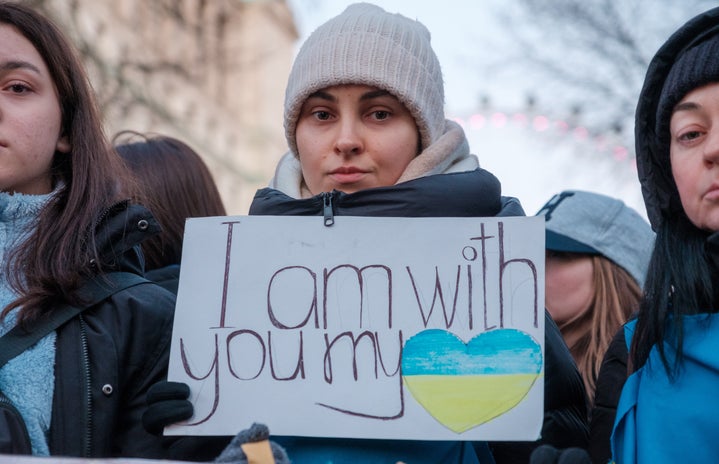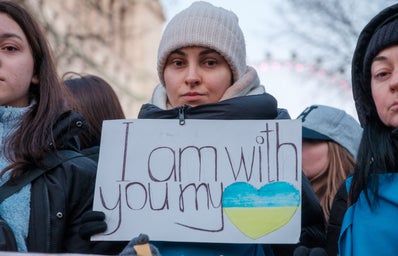The 24th of February marks the anniversary of Russia’s invasion of the Ukraine. Despite many political analysts claiming that a small and relatively limited nation like the Ukraine would never match the stature of its neighbour, almost one year later, the war is still waging on. Yet, this time, victory seems to be in favour of the Ukraine.
In regard to Russia’s physical progress, there is little to show for it. Originally, Putin had set out with the aim of ‘demiliatrising and denazifying’ the Ukraine and additionally, the belief that they could easily implement a takeover of the government without the need for conflict. However, close alliances with powerful Western countries like the United States meant that the Ukraine were able to access over $2 billion in military aid in order to try and combat the Russian threat. In many instances, this has proved advantageous to Ukrainian forces fighting at the border. Over 54% of land captured by Russia at the outbreak of war has been returned to Ukrainian control after months of brutal fighting which has seen significant loss on both sides. The city of Kherson, a place of interest in Russia’s plan to keep complete control of the southern coast, has now seen a withdrawal of Russian troops, a positive step forward yet it is still early doors.
Economically both nations have been impacted as a result of the war. Russia has had numerous sanctions implemented on its banks and companies by Western countries. Even oligarchs like my club Chelsea’s beloved owner, Roman Abrahmovich were forced to resign amid controversy over their close relationship with the Kremlin. But have these sanctions had any real impact on the Russian economy? After all, Russia is one of the top suppliers of natural resources such as aluminium, oil and nickel and cease in demand would mean a collapse in global economic stability which would prove catastrophic for all nations. Sanctions on these vital industries, therefore, have been very limited, instead, countries have placed them on those with more leeway for example, coal and steel where Russian exports to Europe were not as high meaning global economic trouble was less likely to happen. Yet, as we enter the new year, it is evident that this is the beginning of a downward turn in the Russian economy. Financial sanctions, prohibiting the spending of assets and access to capital have caused the rouble to fall by almost 18% and sales of Russian car manufacturing to fall by 60%. Putin and his government have tried to minimise the impact of this fallout through borrowing from the domestic market and increasing public spending yet there is only so long this can go on before a relatively fragile economy can collapse.
Perhaps the Ukraine’s best-kept military tactic was to continue to keep President Volodymyr Zelenksy in office. A charismatic, emphatic and resilient leader, Zelenksy has become a symbol of hope to a nation once plagued with questions over its inclusivity and fairness. His decision to embrace lightheartedness and personal factors in his politics, an ode to his comedic origins, has helped spur a shared sense of patriotism and pride in being not only Ukrainian but also, in being the best version of yourself. Unlike his political rival Putin, Zelenksy’s politics are not catered to a specific ethnic group and are on the basis of empowering ALL Ukranians. Historically, in times of crisis, a leader must possess the necessary characteristics to be the glue that keeps the country together. Take Winston Churchill for example, who arguably helped drive the Allies to victory through his inspirational speeches and resilience even in the most insurmountable challenges. Although perhaps it is too early to place Zelenksy on the exact same pedestal, it is clear that his efforts to transform the relationship between the government and the people have had a significant impact on the strength of the nation in the context of the war.
One year later, the Ukraine appears to have been destroyed by Putin and his army. Families are displaced around the globe, their homes and lives destroyed and landscapes damaged beyond repair. But one thing is for certain, this has done little to dampen the spirits of those brave Ukrainians fighting for their country, both at home and around the globe. The unification of Ukrainian people and allies around the globe has prohibited Russia from achieving its aim of overthrowing the government, despite the odds swinging in their favour. Many political analysts believed that this war would be over before it even started, yet look where we are almost a year later. The Ukrainian army is slowly starting to gain small victories both on land and on the international stage and perhaps, this is solely down to the strength and resilience of the Ukrainian people.


